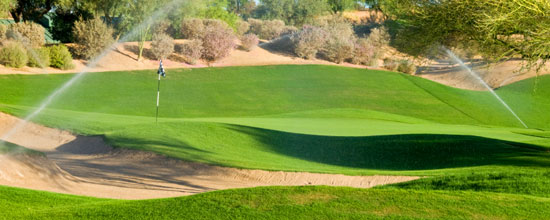When Turfhugger talks about "sustainability" we are careful to not "greenwash". We feel that manufacturing footprint, efficiency during use, product life cycle (what happens once the product has been retired) and good corporate citizenship should be carefully considered when choosing a product for your golf course.
Using this methodology lets review Forsta Filters Inc's automatic self-cleaning screen filters for golf course irrigation systems.
 Footprint and Lifecycle - From raw material and back again
Footprint and Lifecycle - From raw material and back againIn production 70-85% of the unprocessed material comes from recycled sources. Recycled stainless steel or other alloy scrap comprises the fundamental components that will create raw material after melting in an electric furnace. Given that stainless steel is 100% recyclable, after exceptionally long life-spans, stainless steel products can be returned to a mill and forged into new raw material. Likewise, all stainless steel scrap left on hand in the production of new stainless steel forms is collected for recycling from within the plant itself.
"Improved Efficiency"... Okay How?
For this I went straight to Forsta Filters Inc. Eran Fischer.
Turfhugger: Please explain how your filters are "self cleaning"?
Forsta Filters: A unique characteristic of self-cleaning screen filters is that the backwash cycle does not require the entire system flow to stop and reverse, as is the case for many other types of filters. Instead, a point-of-suction backwash reverses flow across the screen only directly in front of suction nozzles. This allows the cleaning mechanism to scan and clean the screen incrementally without disrupting the main flow through the filter.
The self-cleaning screen filter is a type of water filter which utilizes system pressure to clean itself. A rigid cylinder screen strains particles from a water source, trapping debris on the inside. This layer of buildup causes differential pressure across the inlet and outlet. A controller monitors the filter and opens a flush valve when it senses adequate differential pressure. This creates rapid flow through the internal cleaning apparatus, which vacuums buildup from the screen and expels it.
Turfhugger: Any maintenance and costs associated with maintenance?
Forsta Filters: It is recommended to inspect the o-rings and suction nozzles once a year which should not take more than 10-15 minutes. The upkeep of the filter is minimal especially considering that you don't need to replace or clean costly begs and cartridges that are used in other type of water filters.
Turfhugger: Where are the products available and any other points you feel Turfhugger readers would be interested in?
Forsta Filters: Forsta filters are sold worldwide and come with a one year warranty. Implementing a Forsta Filter in new construction or improve old systems will help applicable projects earn LEED certification points. With a commitment to furthering the sustainable use of water, Forsta Filters offers a discount on projects involving improvements to industrial, infrastructure and agricultural/irrigation design.
Check out the Forsta Filters Golf Course Irrigation Case Study below.


2 Comments
Absolute review. I learned so many things again here.
Air Temperature Specialists
A very awesome blog post. We are really grateful for your blog post. You will find a lot of approaches after visiting your post.
Hi! We are ro plant supplier Great points made up above! And
whole house water filter dubai thanks…
I think this is one of the most important information for me. And i am glad reading your article. But should remark on few general things…
EmoticonEmoticon